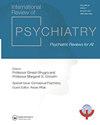Impact of intergenerational conflict on young people and interventions to mitigate its effects: a scoping review
IF 3.7
4区 医学
Q1 PSYCHIATRY
引用次数: 0
Abstract
AbstractBackground Intergenerational conflicts with parents or grandparents have been shown to have adverse effects on young people. Inevitably these conflicts influence the mental health and well-being of young people.Aims The scoping review aimed to identify the extent of existing literature related to intergenerational conflicts in a familial context, including the factors associated with those conflicts and the interventions addressing intergenerational issues.Method Articles across OVID, PubMed, and ERIC databases on intergenerational conflicts involving youth (10–24), parents, and/or grandparents were identified. The review is reported adhering to PRISMA-ScR guidelines.Results From 185 database articles, 43 studies met eligibility criteria, and 4 more were added via cross-referencing, totalling 47. They were grouped into pre-COVID, COVID-related studies, and intervention studies. Parent-child conflict significantly impacted youth mental health, particularly internalising and externalising behaviours. Besides examining the associations, the review addresses the intergenerational conflict in the purview of Gender and cultural differences. Also, a focus on Interventions designed to enhance intergenerational relationships and resolve conflicts was discussed.Conclusions This review illuminates the detrimental impact of intergenerational conflicts within familial dynamics on the mental well-being of young individuals. It also encompasses the distinct landscape of intergenerational conflicts during the COVID-19 pandemic.Keywords: Intergenerational conflictyoung peopleadolescentsyoung adultsscoping reviewinterventions Disclosure statementNo potential conflict of interest was reported by the author(s).Additional informationFundingThis research was supported by the Mariwala Health Initiative.代际冲突对年轻人的影响及缓解其影响的干预措施:范围审查
摘要背景与父母或祖父母的代际冲突已被证明对年轻人有不利影响。这些冲突不可避免地影响到年轻人的心理健康和福祉。目的本综述旨在确定与家庭背景下代际冲突相关的现有文献的范围,包括与这些冲突相关的因素以及解决代际问题的干预措施。方法在OVID、PubMed和ERIC数据库中检索涉及青少年(10-24岁)、父母和/或祖父母的代际冲突的文章。该审查报告遵循PRISMA-ScR指南。结果185篇数据库文章中,有43篇符合入选标准,另有4篇通过交叉参考纳入,共计47篇。他们被分为冠状病毒前研究、冠状病毒相关研究和干预研究。亲子冲突显著影响青少年心理健康,尤其是内化和外化行为。除了研究这些联系外,本文还从性别和文化差异的角度探讨了代际冲突。此外,还讨论了旨在加强代际关系和解决冲突的干预措施的重点。结论本综述阐明了家庭动态中的代际冲突对青少年心理健康的有害影响。它还包含了2019冠状病毒病大流行期间代际冲突的独特景观。关键词:代际冲突;青少年;青少年;本研究得到了马里瓦拉健康倡议的支持。
本文章由计算机程序翻译,如有差异,请以英文原文为准。
求助全文
约1分钟内获得全文
求助全文
来源期刊

International Review of Psychiatry
PSYCHIATRY-
CiteScore
5.10
自引率
0.00%
发文量
85
期刊介绍:
The International Review of Psychiatry is the premier review journal in the field with a truly international authorship and readership. Each bimonthly issue is dedicated to a specific theme relevant to psychiatry, edited by recognized experts on the topic, who are selected by the Editors and the Editorial Board. Each issue provides in-depth, scholarly reviews of the topic in focus. The Journal reaches a broad international readership including clinicians, academics, educators, and researchers who wish to remain up-to-date with recent and rapid developments in various fields of psychiatry. It aims to be of value to trainees by choosing topics of relevance to career development, which are also suitable for clinicians for continuing professional development.
 求助内容:
求助内容: 应助结果提醒方式:
应助结果提醒方式:


